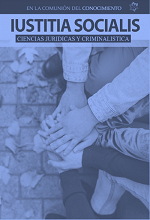Drunkenness as aggravating in crimes that violate the integrity of people
DOI:
https://doi.org/10.35381/racji.v5i3.1128Keywords:
Alcoholic beverage, criminal law, addiction.Abstract
The research was carried out from a quantitative perspective, with a descriptive methodology and a non-experimental design, relying on documentary and bibliographic analysis, which allowed the exploration of documents, norms, laws, and research related to the subject. The objective of this work is to determine the aggravating factor as a vehicular crime against the integrity of people as a result of the state of intoxication. The population with whom this investigation was worked was applied to legal operators familiar with the subject, such as Judges, Prosecutors and Lawyers who presented their opinions on the issue of drunkenness and the aggravation of the penalty in crimes. These were done through the media, by phone, instant messaging and emails. It is concluded that the penalty to the driver should be aggravated when driving while intoxicated, causes the death of one or more people; and, on the other hand, constituting the ingestion of alcoholic beverages (alcoholism) a cultural problem.
Downloads
References
Algora-Buenafé AF, Russo-Puga M, Suasnavas-Bermúdez PR, Merino-Salazar P, & Gómez-García AR. (2017) Tendencias de los accidentes de tránsito en Ecuador: 2000-2015. [Trends in Traffic Accidents in Ecuador:2000-2015]. Rev Gerenc Polít Salud. 16 (33): 52-58. Recuperado de: https://doi.org/10.11144/Javeriana.rgps16-33.tate
Asamblea Nacional Constituyente de la República del Ecuador, (2008). Constitución de la República del Ecuador. Montecristi. Registro Oficial 449 de 20-oct-2008. Recuperado de https://n9.cl/sia
Asamblea Nacional Constituyente de la República del Ecuador (2008). Reglamento a la Ley de Transporte Terrestre Transito y Seguridad Vial. [ Regulations to the Law on Land Transit Transport and Road Safety] Decreto Ejecutivo 1196 Registro Suplemento 731 de 25-jun-2016 última modificación 14-nov-2016.
Asamblea Nacional de la República del Ecuador. (2014). Código Orgánico Integral Penal. [Comprehensive Organic Criminal Code]. Recuperado de https://n9.cl/g6sc
Cruz-Piza, I., Pozo-Lucio, J., & Gómez-Naranjo, V. (2020) El estado de embriaguez y su incidencia en los accidentes de tránsito [The state of intoxication and its incidence in traffic accidents]. IUSTITIA SOCIALIS.5(3),124-133. Recupedarado de: http://dx.doi.org/10.35381/racji.v5i3.1089
Diario el Metro (10-noviembre de 2019) Ecuador: más de 300 mil accidentes de tránsito se registraron en los últimos 10 años. [Ecuador: more than 300,000 road accidents have been recorded in the last 10 years]. Recuperado de: https://n9.cl/qdl75
Organización Panamérica de la Salud (2017) Beber y Conducir [Drinking and Driving]. Recuperado de: https://n9.cl/xro5
Organización Mundial de la Salud (2018). El consumo nocivo de alcohol mata a más de 3 millones de personas al año, en su mayoría hombres. [Harmful alcohol consumption kills more than 3 million people a year, mostly men]. Recuperado de: https://n9.cl/hiwo4
Real Academia Española. (2019). Diccionario de la Real Academia Española. [Dictionary of the Royal Spanish Academy] Recuperado de: https://dle.rae.es/embriaguez
Sotomayor-Acosta, J. & Álvarez-Álvarez, J. (2014) El homicidio imprudente agravado por la embriaguez o el influjo de sustancias que produzcan dependencia física o psíquica [Reckless homicide aggravated by drunkenness or influx of substances that cause physical or mental dependence]. Revista Nuevo Foro Penal. 10(83),128-166. Universidad EAFIT.
Published
How to Cite
Issue
Section
License
CC BY-NC-SA : Esta licencia permite a los reutilizadores distribuir, remezclar, adaptar y construir sobre el material en cualquier medio o formato solo con fines no comerciales, y solo siempre y cuando se dé la atribución al creador. Si remezcla, adapta o construye sobre el material, debe licenciar el material modificado bajo términos idénticos.
OAI-PMH URL: https://fundacionkoinonia.com.ve/ojs/index.php/Iustitia_Socialis/oai










